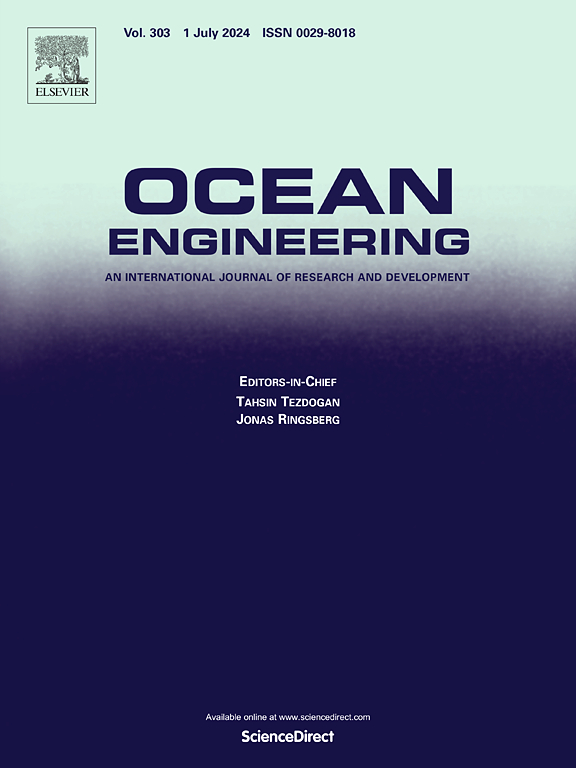Theoretical and experimental study on the performance of the hydraulic power unit employed on full ocean depth manned submersible
IF 5.5
2区 工程技术
Q1 ENGINEERING, CIVIL
引用次数: 0
Abstract
With the growing demand for deep-sea exploration and resource development, full ocean depth manned submersibles play a crucial role in these efforts. Within the submersibles, hydraulic power unit (HPU) experiences performance changes due to the high pressure in the deep-sea environments. This study systematically investigates the performance evolution of HPUs in such conditions, focusing on pressure-induced variations in hydraulic oil properties (viscosity, density, and bulk modulus) and their effects on the components. A theoretical model was developed using Amesim to simulate the dynamics of HPU, considering depth-dependent fluid characteristics. Experimental validation was conducted in a high-pressure chamber with an ambient pressure of 115 MPa under no-load and 19 MPa load conditions. It is found that, from the surface to full ocean depth, the power consumption of the HPU increased by 0.792 kW (under no-load conditions) and by 0.825 kW (under loaded conditions). This increase is attributable to the amplified viscous losses resulting from the increased viscosity. Conversely, the enhanced fluid damping effect under high pressure stabilizes the flow output. The theoretical model demonstrated good agreement with the experimental data, confirming its predictive capability for HPU behavior in deep-sea environments. These results provide critical insights into the design of deep-sea HPUs.
全大洋深度载人潜水器液压动力装置性能的理论与实验研究
随着深海勘探和资源开发需求的不断增长,全大洋深度载人潜水器在其中发挥着至关重要的作用。在潜水器中,由于深海环境中的高压,液压动力单元(HPU)的性能会发生变化。本研究系统地研究了hpu在这种条件下的性能演变,重点研究了压力引起的液压油性能(粘度、密度和体积模量)的变化及其对组件的影响。考虑流体随深度变化的特性,利用Amesim软件建立了HPU动力学仿真理论模型。在环境压力为115 MPa的高压实验室内进行了空载和19 MPa负载条件下的实验验证。研究发现,从海面到全海深度,HPU的功耗分别增加了0.792 kW(空载工况)和0.825 kW(载工况)。这种增加是由于粘度增加导致的粘性损失扩大。相反,高压下增强的流体阻尼效应使流量输出稳定。理论模型与实验数据吻合较好,验证了该模型对深海环境下HPU性能的预测能力。这些结果为深海高性能处理器的设计提供了重要的见解。
本文章由计算机程序翻译,如有差异,请以英文原文为准。
求助全文
约1分钟内获得全文
求助全文
来源期刊

Ocean Engineering
工程技术-工程:大洋
CiteScore
7.30
自引率
34.00%
发文量
2379
审稿时长
8.1 months
期刊介绍:
Ocean Engineering provides a medium for the publication of original research and development work in the field of ocean engineering. Ocean Engineering seeks papers in the following topics.
 求助内容:
求助内容: 应助结果提醒方式:
应助结果提醒方式:


